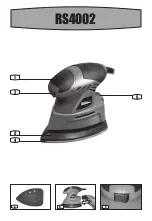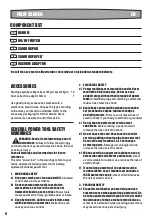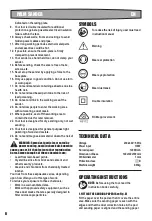
5
Palm SandeR
en
b) Use personal protective equipment. Always
wear eye protection.
Protective equipment
such as dust mask, non-skid safety shoes, hard
hat, or hearing protection used for appropriate
conditions will reduce personal injuries.
c) Prevent unintentional starting. ensure the
switch is in the off-position before connecting
to power source and/or battery pack, picking
up or carrying the tool.
Carrying power tools
with your finger on the switch or energising power
tools that have the switch on invites accidents.
d) Remove adjusting keys or wrench before
turning the tool on
.
A wrench or a key left
attached to a rotating part of the power tool
may result in personal injury.
e) do not overreach. keep proper footing and
balance at all times
.
This enables better control
of the power tool in unexpected situations.
f) dress properly. do not wear loose clothing or
jewellery. keep your hair, clothing and gloves
away from moving parts.
Loose clothes, jewellery
or long hair can be caught in moving parts.
g) If devices are provided for the connection of
dust extraction and collection facilities, ensure
these are connected and properly used.
Use of
these devices can reduce dust-related hazards.
4. POweR TOOl uSe and CaRe
a) do not force the power tool. use the correct
power tool for your application.
The correct
power tool will do the job better and safer at the
rate for which it was designed.
b) do not use the power tool if the switch does not
turn it on and off.
Any power tool that cannot be
controlled with the switch is dangerous and must
be repaired.
c) disconnect the plug from the power source
and/or the battery pack from the power tool
before making any adjustments, changing
accessories, or storing power tools.
Such
preventive safety measures reduce the risk of
starting the power tool accidentally.
d) Store idle power tools out of the reach of
children and do not allow persons unfamiliar
with the power tool or these instructions
to operate the power tool.
Power tools are
dangerous in the hands of untrained users.
e) maintain power tools. Check for misalignment
or binding of moving parts, breakage of parts
and any other condition that may affect the
power tools operation. If damaged, have the
power tool repaired before use.
Many accidents
are caused by poorly maintained power tools.
f) keep cutting tools sharp and clean.
Properly
maintained cutting tools with sharp cutting edges
are less likely to bind and are easier to control.
g) use the power tool, accessories and tool bits
etc. in accordance with these instructions and
in the manner intended for the particular type
of power tool, taking into account the working
conditions and the work to be performed.
Use of
the power tool for operations different from those
intended could result in a hazardous situation.
5. SeRVICe
a) Have your power tool serviced by a qualified
repair person using only identical replacement
parts.
This will ensure that that safety of the
power tool is maintained.
addITIOnal SafeTy
InSTRuCTIOnS fOR yOuR Palm
SandeR
1. Harmful/toxic dusts will arise from sanding e.g.
lead painted surfaces, woods and metals. Contact
with or inhalation of these dusts can endanger the
health of operator and bystanders. Always use eye
glasses and dust mask.
2. Hearing protection should be worn when using the
sander.
3. Hold power tools by insulated gripping surfaces
when performing an operation where the
cutting tool may contact hidden wiring or its
own cord.
Contact with a” live” wire will make
exposed metal parts of the tool” live” and shock
the operator
4. always wear safety glasses or eye shields
when using the sander. everyday eyeglasses
have only impact-resistant lenses; they are not
safety glasses.
Following this rule will reduce the
risk of serious personal injury.
5. Remove the plug from the socket before carrying
out any adjustment, servicing or maintenance.
6. Fully unwind cable drum extensions to avoid
potential overheating.
7. When an extension cable is required you must
ensure it has the correct ampere rating for your
power tool and is in a safe electrical condition.
8. Ensure your mains supply voltage is same as
Summary of Contents for ShopSeries RS4002
Page 1: ...RS4002 PalmSander EN...
Page 2: ......
Page 3: ...RS4002 D A B C 1 2 3 4 5 D A B C 1 2 3 4 5...
Page 8: ...MadeInPRC Copyright 2013 Positec All Rights Reserved...


























